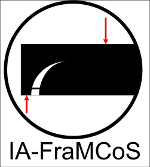|
|
|
Mini Symposia > MS8 Concrete at high temperaturesMS8: Concrete at high temperatures Organisers: H. Carre & R. Felicetti The objective of this Mini Symposium is to address all fracture-related processes occurring in heated concrete, in the framework of the six research tracks outlining the FraMCoS conference. High temperature is known to induce several chemo-physical effects in concrete. Among them, inhomogeneous and restrained thermal dilation may trigger cracks at both the meso and the structural scales. The concurrent rise of pore pressure due to water vaporization may contribute to crack instability, leading to the violent expulsion of fragments from the concrete cover. A tentative, not exclusive list of subject is provided in the following. A) Theoretical Fracture Mechanics interaction between fracture and pore pressure fracture under restrained thermal dilation stability criteria for concrete cover in fire conditions
B) Experimental Methodologies fracture tests at high temperature (steady/transient, hot/residual conditions) fracture detection and monitoring during high temperature tests disturbance induced by probes and sensors
C) Computational modelling Numerical approaches of fracture at high temperatures at different scales
D) Durability/Coupled problems effect of damage on concrete permeability
E) Novel cementitous and/or other quasi-brittle materials effects of alternative binders (slag cement, calcium sulfate, calcium aluminate, etc) mechanical effects of fibre
F) Structural concrete applications spalling criteria for structural fire safety design effect of high temperature on fracture related mechanisms (shear, punching, bond, bending stiffness, etc) |


